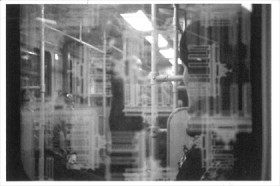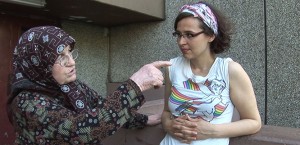Daphna Westerman’s Postcards in Motion

One of Daphna Westerman’s postcards, front view. © Jewish Museum Berlin, Photo: Lisa Albrecht
Did you find a postcard like this one in your mail box as well? Or have you even pulled the entire road movie by Daphna Westerman out of our Art Vending Machine? By now the Machine is sold out completely. But no need to stop the movie! Let’s just rewind a little…
Before the work of the Israeli artist ended up in the museum’s Art Vending Machine, I received a postcard with a black and white photograph. Except for my address and the title, “U-Bahn Berlin. From In and between the cities, 2011. A film by Daphna Westerman,” there was nothing more to it. A few days later more cards were in the mail. Time to phone Daphna. → continue reading
When I first heard that the Jewish congregation of Pinneberg is giving “church asylum” to a Muslim, I had to chuckle. The article about it in the online magazine Migazin put the words “church asylum” in quotation marks and used a picture of the dome of the synagogue on Berlin’s Oranienburger Straße – making the linking together of the three monotheistic religions appear intentional.
But now I heard from a friend that there’s a film about the Kiddush asylum at the Pinneberg congregation for a man from the Sudan, and I had to wonder why “church asylum” isn’t “synagogue asylum”.
The Kiddush is a blessing spoken over a goblet of wine at the beginning of a holy day, in order to sanctify the day. Church asylum, as I learned from the film, is actually about a sacred room that protects people who are under threat. The Jewish congregation in Pinneberg has one such room. And it is encouraging to hear – as the head of the congregation explains in the film – why they are using this space to protect a person, at least temporarily, from persecution.
Rosa Fava, director of the “Diversity in Schools” project

Canan Turan with her grandmother
© Adriana Uribe
In our series of events “New German Stories” we present different perspectives on the immigration country Germany. That immigrants from Turkey, Vietnam, Poland, India and Cameroon and their descendants have stories to tell is nothing new—the novel twist is, that they present them here as German stories. On Tuesday, 8 July, director Canan Turan will be a guest of the Academy of the Jewish Museum. In her film KIYMET, she tells the story of her grandmother, who migrated to Berlin from Turkey in the early 70s. We asked Canan three questions about her project:
How did the idea to make a film about your grandmother Kıymet come about? → continue reading

